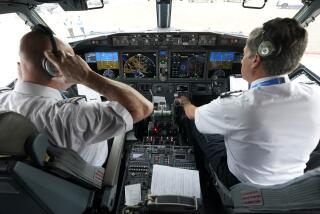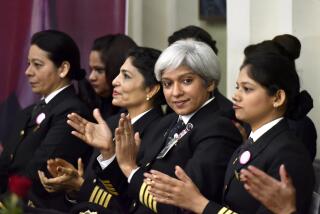Pan Am to Pay Former Pilots $17.2 Million in Age Bias Case
- Share via
SAN FRANCISCO — In a record settlement, Pan American World Airways has agreed to pay $17.2 million to about 100 former pilots who had been barred from becoming flight engineers because of their age, federal officials announced Wednesday.
Attorneys in the seven-year-old case said the agreement, if approved by a federal judge, would represent the largest cash settlement in any case ever brought under the federal Age Discrimination in Employment Act.
Agreement was reached among lawyers for the airline, the pilots and the U.S. Equal Employment Opportunity Commission just before closing arguments were to be made before a federal district court jury here that has been hearing the case since Dec. 8.
Under the settlement, between 91 and 106 former Pan Am pilots from throughout the nation who had reached 60 but had not been allowed to stay on as lesser-paid flight engineers will receive an estimated $175,000 each in compensatory back pay.
In addition, EEOC lawyers said, the airline now will permit the pilots who are able to do so to return as flight engineers, with remedial training as necessary. Other pilots who approach age 60 in the future also may transfer to flight engineer jobs with Pan Am under the agreement.
Federal regulations prohibit people at age 60 or older from working as pilots or co-pilots on scheduled commercial passenger carriers.
But no such rules bar those 60 or over from working as flight engineers, and currently, all but one airline--American Airlines--allow flight engineers over 60, attorneys in the case said.
Supporting Role
Flight engineers ride along with pilots in the cockpit, monitoring electrical, mechanical and fuel instruments. Such people have some pilot training and, while not being paid as much as pilots, can earn up to $90,000 annually, the lawyers said.
Attorneys for the EEOC, which brought the case in 1981, and the former pilots who joined in the suit released terms of the settlement at a news conference here.
In a statement issued to reporters, EEOC Chairman Clarence Thomas called the agreement “further evidence that the EEOC is serious about its vigorous law enforcement program.”
Sanford Jay Rosen, a San Francisco lawyer representing some of the pilots, credited his clients for continuing to press their claims through the protracted proceedings.
“They did what is absolutely necessary to assure anti-discrimination laws are enforced,” Rosen said. “They said ‘no’ . . . that they would not be outdone of what they were entitled to under the laws of this country.”
Spokesmen for Pan Am, reached by telephone, stressed that the company had made no admission of discrimination but agreed to the settlement to avoid the uncertainty of a jury verdict that could have resulted in a far more expensive award.
In earlier proceedings, a $1.5-million tentative settlement, an outgrowth of a 1985 U.S. Supreme Court decision upholding the discrimination claims of other former pilots in a case against Trans World Airlines, had been rejected as “inadequate” by U.S. District Judge Robert F. Peckham.
The judge noted that the airline could be held liable for more than $26 million in damages--with that amount doubled if it were found to have willfully discriminated against the pilots.
Pan Am had steadfastly denied any intent to discriminate, citing safety reasons as its basis for refusing until a policy change in 1983 to permit pilots to become flight engineers.
The company’s concern was that pilots, as former captains of the ship, would not fit easily into subordinate roles, particularly in an emergency when quick and decisive action was required.
An airline spokesman said that studies and experience since have shown that such fears were not justified. “We had been concerned over role reversals,” said Jeff Kriendler, vice president for corporate communications. “Now we believe that is not a safety factor.”
Some of the former pilots in the case expressed mixed emotions about the case, hailing the settlement but voicing regret that now, with advanced age and other vocations, they would not choose to return as flight engineers.
‘It’s Been Too Long’
“I don’t think I’ll return--it’s been too long,” said Robert McMurray of Melbourne Beach, Fla. “When I was 60 years old and captain of a 747 it would have been a simple matter to slide into the next seat in the cockpit and become a flight engineer. Now I’m 68, and I doubt if I will go back.”
The agreement is scheduled for review before Judge Peckham on March 24. Attorneys and pilots present at the news conference said they expect the judge to approve the settlement.
Under the agreement, the $17.2 million will be paid out in four installments over the next 2 1/2 years. The previous high award in an age discrimination case involved an $18-million judgment, won by former pilots in a similar action against United Airlines, that was subsequently reduced to $11 million, according to Rosen and James C. Sturdevant of San Francisco, another attorney in the suit against Pan Am.
The airline also has agreed to pay legal fees, expected to exceed $1 million, to the private attorneys in the case.
More to Read
Inside the business of entertainment
The Wide Shot brings you news, analysis and insights on everything from streaming wars to production — and what it all means for the future.
You may occasionally receive promotional content from the Los Angeles Times.










